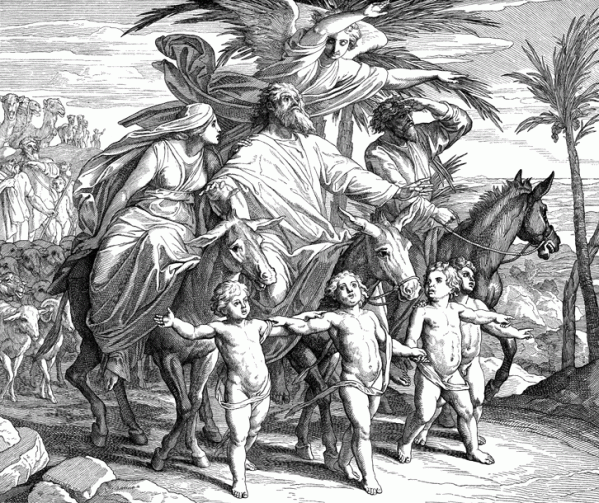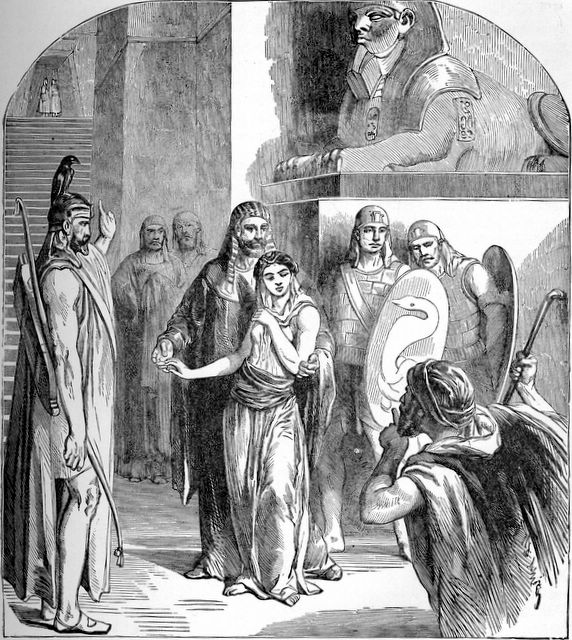In Chapter 11, we are introduced to Abram and his wife Sarai. We learned of their lineage and how they came to live in Haran. Now we will get to see Abram’s character. But first, we get to learn more about the character of God. Through no merit of his own, God chooses to speak directly to Abram. I’m going to paste the whole conversation below and we’ll discuss each of the things God tells Abram:
Get out of your country,
From your family
And from your father’s house,
To a land that I will show you.
I will make you a great nation;
I will bless you
And make your name great;
And you shall be a blessing.
I will bless those who bless you,
And I will curse him who curses you;
And in you all the families of the earth shall be blessed.”
Imagine you are living your life and all of a sudden you are given a promise of this magnitude. This is an introduction to what we call the Abrahamic Covenant. It will be officially made in chapter 15, and reaffirmed several times throughout Scripture, and referred to for the rest of the Old Testament, as well as in the New Testament, where the promise seems to envelop something even larger. We’ll discuss that well in the future. For now, let us focus on what the covenant actually says.
First, Abram is told to leave Haran for a new land. That is really the extent of what God is asking for the covenant. The rest of the covenant is what God will do. God promises to make him into a great nation. This is referring to the nation of Israel. God promises to bless Abram, making Abram’s name great. He will be so blessed that those who know him will be blessed, but those who disregard him or curse him will be cursed. All of the families of the earth shall be blessed through Abram. I want to focus on this point here. In what way will the families of the earth, or later in Genesis 18, the nations of the earth, be blessed through Abraham? Let’s look at what Paul has to say in Galatians 3:5-9.
Therefore He who supplies the Spirit to you and works miracles among you, does He do it by the works of the law, or by the hearing of faith?–just as Abraham ‘believed God, and it was accounted to him for righteousness.’ Therefore know that only those who are of faith are sons of Abraham. And the Scripture, foreseeing that God would justify the Gentiles by faith, preached the gospel to Abraham beforehand, saying, ‘In you all the nations shall be blessed.’ So then those who are of faith are blessed with believing Abraham.”
What I think Paul is saying here is significant for a couple of reasons. First, it shows that the Gospel is not something restricted to the New Testament. Notice that the Gospel was preached to Abraham, when God said that through him all the nations shall be blessed. The second thing I see as significant about this quote is that we who are believers have been blessed by the hearing of faith just like Abraham. This is how God is blessing all the families of the earth through Abraham. We are still taking part in the Abrahamic Covenant today We are being blessed with believing Abraham.
Well, we’ve made it to verse 4. Notice that the distance between when the Covenant is spoken and when Abram leaves Haran is not told, but it seems to be immediate. This is one of the most striking features of Abram’s character. He will be flawed, making many mistakes along the way, but when God tells him to do something, Abram seems to obey without hesitation. Imagine the faith it would require to pack up everything and leave a land you are familiar with to go to a completely new place, as yet unknown to Abram, which could be hostile toward him. This is one of the reasons he will later be referred to as a hero of the faith, having done things by faith. Abram is 75 at this time, and apparently Lot goes with him. Lot will become more important in chapter 13.
Abram and his wife and Lot’s family arrive in Canaan. Now the Lord appears to Abram and tells him that this is the land that He will give him. In this place, Abram builds an altar to the Lord. Abram keeps journeying, eventually ending up in Egypt, presumably because of the famine which was fairly severe at the time. Now we are going to see a bit of a conflict here in Abram’s character. Let’s start with the positive. When Abram needs to make a decision about the famine, he could have most easily returned hom to Ur, but he holds to God’s promise and does not return there. This is encouraging news. However, before he enters Egypt, Abram fears for his life. He thinks because Sarai is beautiful and because he is her husband that the Egyptians will be jealous and kill him and take her. So he asks Sarai to say she is his sister, thinking that he can help God achieve His promise.
Sarai’s beauty does draw attention and the plan seems to work, until Sarai is taken into Pharaoh’s harem. Because Abram is her “brother”, he is treated well for her sake, being made rich with livestock. But God is still in control. He plagues Pharaoh’s house with great plagues because of Sarai. Abram seemed to have selfish motives (“that I may live”), but God does this for Sarai’s sake. Pharaoh seems to figure out what is going on and realizes he’s been lied to by Abram. He asks why Abram didn’t tell him he was Sarai’s husband and then commands him to leave. Ultimately, I think this ends better than it could have. Pharaoh, it turns out, wasn’t that bad of a guy and Abram’s fear of being killed was unfounded. He should have realized that God’s promise did not depend on his cleverness. Abram’s selfish actions resulted in a plague, and made him look foolish in front of Pharaoh. Abram is forced to leave Egypt.

